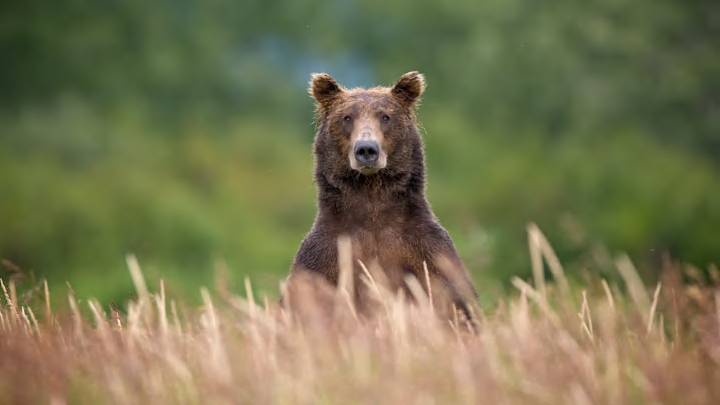In addition to getting your dad a card or new tie this Father’s Day, be sure to thank him for not trying to eat you when you were young. Devouring babies may sound savage and strange, but when it comes to certain species, kids becoming a meal for their fathers is just par for the course.
Lions

You may already know that a male lion that recently became head of his pride will usually kill all the cubs sired by the previous leader. But while that makes lions terrible step-dads, it doesn’t make them terrible fathers. What makes lions bad dads is a combination of greed and laziness. Papa lions spend most of their day lying in the shade, waiting for one of their mates to bring home dinner. The female does the majority of the hunting and pretty much all of the parenting; the male’s job is to protect his territory from other prides and scavengers like hyenas.
Once the mama brings home her kill, the male lion is always the first one to eat and he often leaves only scraps for the rest of the pride—including any of his recently weaned children.
Grizzly Bears

It’s rare for any animal-kingdom father to eat his own young when he isn’t desperate for food, but the male grizzly bear will do just that. These creatures are extremely protective of their territories—which can range all the way up to 1500 miles—and are opportunistic hunters, willing to kill and eat anything that happens to enter their home turf. Even cubs, whether they’ve sired them or not. Males may also kill cubs to force their mother to go into estrus so he can breed with her.
Bass

There are a lot of bad aquatic fathers. In fact, even those that are highly protective of their spawn, like male bass, are still prone to eating their own children. In the case of the bass, this occurs after most of the newborns have swum away and a few stragglers remain. Suddenly daddy stops protecting his kids from predators and becomes a predator himself, swallowing up all of the stragglers as a reward to himself for helping the strong ones stay alive.
Sand Goby

Similarly, the male sand goby is relentless about guarding his eggs from predators, but even if he has plenty of extra food available, he will still eat about a third of his brood. Research into how he decides which eggs to keep and which to eat reveals that size matters: male gobies tend to eat the largest eggs. In many species, large babies mean a higher chance for survival—and thus, they are the most protected members of the family—but the sand goby knows that the largest eggs take longest to hatch. Pops snacks on the eggs that would take the longest to develop so he can get out of there and back to mating as soon as possible.
Assassin Bug

With a name like “assassin bug” you’d hardly expect this insect to be sweet, but filial cannibalism is still pretty gruesome. The male assassin bug is tasked with protecting his eggs until they hatch. His tactic mostly involves eating the eggs on the outside edges of the brood, which are otherwise most likely to fall victim to parasitic wasps. This defensive strategy is so hardwired that the bugs do it even in laboratory settings completely devoid of any potential parasites. Scientists believe this is because eating the eggs doesn’t only protect the insects against possible parasites, but also provides the male assassin bug with ample nutrients when his guard duty leaves him unable to forage.
Interestingly, assassin bugs do have a bit of a soft spot—the males are some of the only insects that are willing to adopt broods from other fathers. (They don’t eat any extra eggs when their kids are adopted.)
Read More About Animals:
A version of this story originally ran in 2012; it has been updated for 2025.
